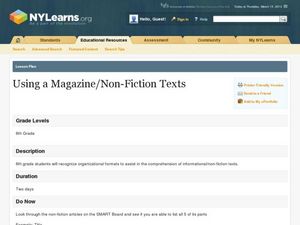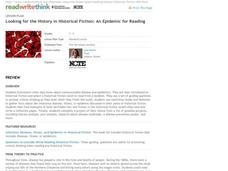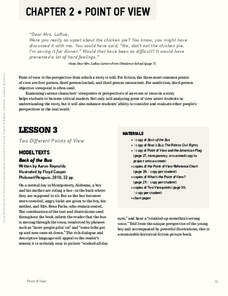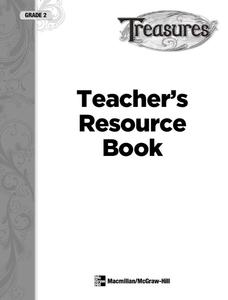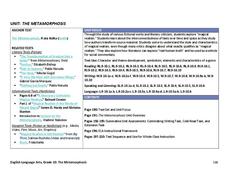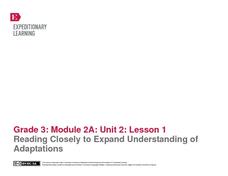Curated OER
Using a Magazine/Non-Fiction Texts
Working with magazine articles and other informational texts, students identify the parts of a non-fiction work. The learners use SMART board files to guide instruction, as well as a transition to writing their own non-fiction article in...
Roseburg Public Schools
Library Skills and Literature
The library is such a valuable resource for kids of all ages. Help elementary readers learn all about parts of the library, text features for both fiction and nonfiction text, and different ways to find books that they want to read.
The New York Times
Fiction or Nonfiction? Considering the Common Core's Emphasis on Informational Text
Nothing aids in comprehension more than an explanation and understanding of why things are done. Address why the Common Core requires the reading percentages that it established and analyze how this affects your readers. Learners read...
Civil War
Civil War Medicine: Fact or Fiction
Young historians compare the presentation of medical care during the Civil War in passages from fictional and nonfictional texts. They examine passages from Gone with the Wind by Margaret Mitchell and Soldier's Heart by Gary Paulsen, and...
Hood River County School District
Text Structure: Features and Organization
Teach learners how to interact with both fiction and non-fiction text with a packet of activities and worksheets. After looking over text structure and the difference in text features between different types of writing, readers analyze...
National Council of Teachers of English
Writing Acrostic Poems with Thematically Related Texts in the Content Areas
Scholars scour thematically aligned texts to gather a bank of words they can use in an original acrostic poem.
ReadWriteThink
Looking for the History in Historical Fiction: An Epidemic for Reading
Combine informational reading skills with fictional text in an innovative historical fiction lessons. After reading a fictional text related to diseases, class members read non-fictional text to gain knowledge about specific infectious...
National Council of Teachers of English
Timelines and Texts: Motivating Students to Read Nonfiction
With the emphasis on incorporating more nonfiction in language arts classes the question arises about how to design activities that motivate kids to engage with informational text. How about an assignment that asks class members to...
K20 LEARN
Writing An Argumentative Paragraph: Argumentative Writing
Learning how to craft a cogent argument based on a solid claim, supported with evidence and solid reasoning, is an important life skill. Teach middle schoolers about argumentative writing with a lesson asking them to analyze the claims,...
Scholastic
Point of View
The point of view in a story can dramatically change the story itself. Focus on finding the points of view in various reading passages with a language arts packet, which includes fiction and nonfiction text.
ReadWriteThink
"Three Stones Back": Using Informational Text to Enhance Understanding of Ball Don't Lie
"Three Stones Back," a passage from Matt de la Pena's best-seller, Ball Don't Lie, allows readers to practice their close reading skills as they compare the passage to an information text about wealth inequality.
Curated OER
Sign of the Beaver: Book Club Discussion
Good question are the heart of great discussions. To prepare for a book club discussion, introduce young readers to the characteristics of good conversation-starting questions. Practice crafting questions for a text the class has...
Curated OER
Library Lesson Plan
Explain the differences between fiction and non-fiction and the characteristics of a biography. Learners analyze three pieces of literature on the same topic to determine which is fiction and which is non-fiction. In the end, relate the...
Curated OER
Reintroduce: Main Idea
What would a main idea be without important details? Readers use a graphic organizer to record key details from an informational text (a fiction text would also work). Review main idea as a concept before beginning, asking scholars to...
EngageNY
Close Reading: Paragraph 4 of “Refugee and Immigrant Children: A Comparison”
Why is reading a text closely a helpful skill? Using the 13th of 20 lessons from the Grade 8 ELA Module 1, Unit 2 series, scholars continue reading the informational text "Refugee and Immigrant Children: A Comparison." They work with...
Media Smarts
Media Awareness Network: Hate or Debate?
Discuss the difference between legitimate debate on a political issue and arguments that are based on hate through a science-fiction scenario that shows how a controversial issue can be discussed in both ways. Then learn how purveyors of...
K20 LEARN
Bear Tale: Author's Purpose - Informing Or Entertaining
After reading The Mitten by Jan Brett, scholars discuss the author's purpose. Small groups compare and contrast a book written to entertain and a book to inform, then create a T-Chart detailing the characteristics of each. Learners...
Utah Education Network (UEN)
Know Your Literature Genres
Open the library for young readers by introducing them to the main genres and sub-genres. A podcast and two presentations identify the characteristics of the different genres. Groups then sort through a box of books and, using evidence...
Curated OER
Reading Comprehension Exercise
Looking to increase reading comprehension? Teach this lesson, which is flexible enough to use with either informational texts or with literature. Teams of boys and girls work together to answer a comprehension question after listening to...
McGraw Hill
Phonics Teachers Resource Book
Looking to improve your classes literacy program? Then look no further. This comprehensive collection of resources includes worksheets and activities covering everything from r-controlled vowels and consonant digraphs, to the different...
Curated OER
Nonfiction Genre Mini-Unit: Persuasive Writing
Should primary graders have their own computers? Should animals be kept in captivity? Young writers learn how to develop and support a claim in this short unit on persuasive writing.
Avi Writer
Crispin: The End of Time
Crispin: the End of Time is the core text for this teaching guide, a valuable resource for those who use Avi's trilogy as whole-class reading, in book circles, or as independent reading.
Louisiana Department of Education
The Metamorphosis
How can something be true even if it didn't happen? Invite your classes to investigate the truths found in the world of magical realism as they analyze short stories, poems, informational texts, video, and art from this genre.
EngageNY
Reading Closely to Expand Understanding of Adaptations
Third graders work to determine the main idea, recall key details, and answer questions using an informational text on the topic of animal adaptations. Using the non-fiction text "Staying Alive: Animal Adaptations" (provided) the teacher...


